Shares of retail brokerage Robinhood popped Thursday after a report that U.S. regulators would not ban payment for order flow, a key part of the company’s business model.
Bloomberg News reported that the Securities and Exchange Commission would stop short of banning payment for order flow, though the regulatory agency may still make rule changes that could lower the profitability of the practice.
Shares of Robinhood were up more than 8% in premarket trading.
Payment for order flow is a controversial practice that effectively allows market makers and brokerage firms to split the profit made on trades from retail customers. It is a key source of revenue for Robinhood and other low cost brokerage firms, and it helps them offer trading with no up-front cost.
SEC Commissioner Gary Gensler has been critical of the practice, questioning whether the payment relationships between market makers and brokerage firms was hurting the execution price for customer trades.
“Our markets have moved to zero commission, but it doesn’t mean it’s free. There’s still payment underneath these applications. And it doesn’t mean it’s always best execution,” Gensler told CNBC’s “Squawk on the Street” last year.
Robinhood and the SEC did not immediately respond to requests for comment.
